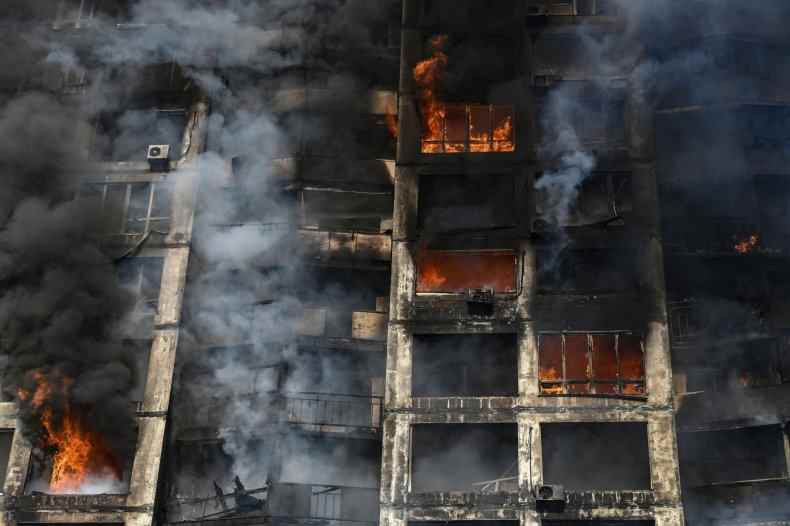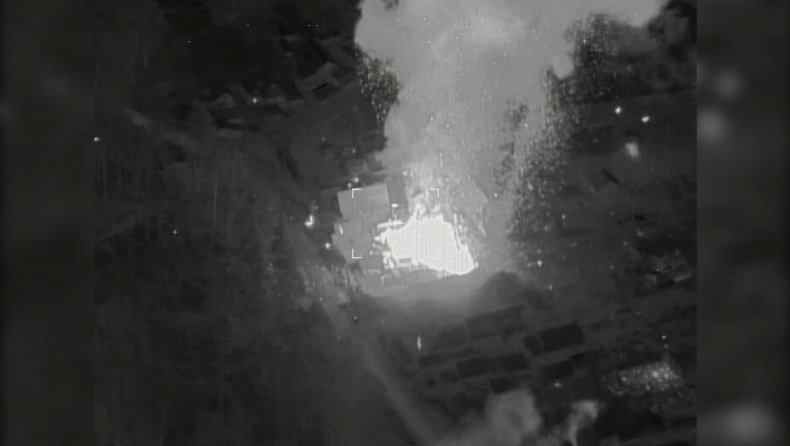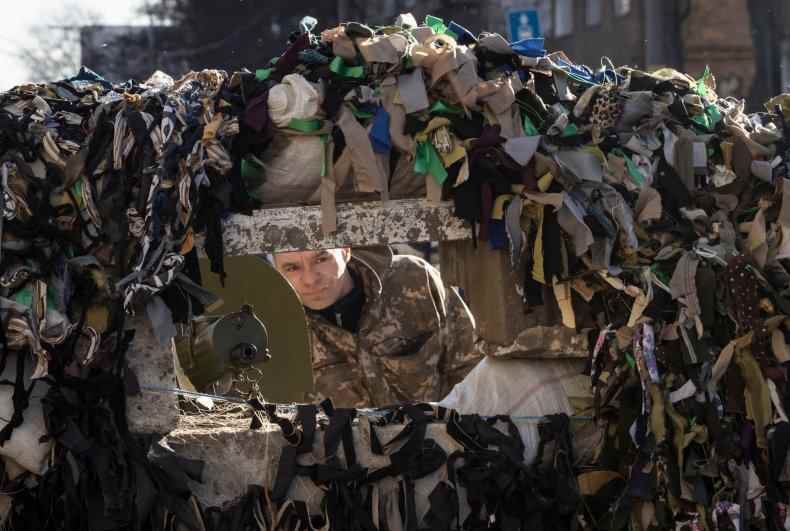As Russia’s war in Ukraine entered into its fourth week, both sides have identified cautious signs of progress toward a potential deal to end the conflict, but a lack of trust and the ongoing hostilities has clouded the diplomacy with lingering uncertainty.
Russian Foreign Ministry spokesperson Maria Zakharova told Newsweek at a press conference on Thursday that the very fact Russia-Ukraine talks are taking place “is a sign of progress, it means that there is progress whenever there are negotiations.”
Zakharova declined to go into details “as to the essence of the discussions, saying what the progress is and what the progress is not,” citing their closed-door nature. But she emphasized that the existence of talks marked an “achievement.”
She said the situation—characterized by Russian President Vladimir Putin as a “special military operation”—is “very complicated” and that the negotiations span “military, political and humanitarian aspects.”
As for Russia’s own demands, however, Zakharova said they were “simple” and “in line with the goals and purposes of this special military operation.”
In announcing the operation late last month, Putin called for the “demilitarization” and “denazification” of Ukraine, claiming Western military support and far-right fighters constituted a threat to Russia’s national security.
The Kremlin has since outlined conditions. They include an end to Ukraine’s bid to join the U.S.-led NATO alliance; recognition of the independence of two breakaway republics in the eastern Donbas region; and acknowledgment of Russia’s control over the Crimean Peninsula, annexed by Moscow in 2014.
“We call on the regime of President Zelensky to think of the future of his country and its citizens and draw conclusions and take effective decisions,” Zakharova said Thursday.
The remarks came a day after Financial Times reported on an apparent 15-point draft agreement to end the conflict that has now entered its fourth week.
The plan would reportedly establish a ceasefire and include provisions through which Ukraine would declare neutrality in exchange for security guarantees and the withdrawal of Russian troops.
Ukrainian presidential spokesperson Mykhailo Podolyak quickly tempered hopes that any deal was imminent, however, issuing a statement that the proposal represented only “the requesting side of the Russian position” and “nothing more.”
“The only thing we confirm at this stage is a ceasefire, withdrawal of Russian troops and security guarantees from a number of countries,” he added.
Russian Presidential Press Office/Ukrainian Presidential Press Office
Iuliia Mendel—Zelensky’s former press secretary who is in close contact with the government and peace negotiators—told Newsweek there is still hope for a deal but that there is little trust on Kyiv’s side.
“The Ukrainian negotiators were, I wouldn’t say optimistic, but they were looking forward to the negotiations and put a lot of weight on them. This was the only working format,” Mendel said.
“Probably they can reach some deal, and as I have mentioned Ukraine sees possible solutions. But we understand that we have to deal with a terrorist state. How reliable is this? There is no assurance it will ever work.”
She also later referenced Kremlin spokesperson Dmitry Peskov’s remarks Thursday in which he suggested no deal was imminent.
“Our delegation is putting in colossal effort and demonstrates more readiness towards them than the other side,” he said, per Reuters. “Agreeing such a document, the observance of all its parameters and their implementation could very quickly stop what is happening.”
The question of Ukraine’s occupied territories will likely be the biggest obstacle to any eventual deal. Kyiv has never given up the hope of recovering Crimea and separatist-held Donbas, and may soon also have to fight to reclaim the southern Kherson oblast if Moscow proceeds with plans to hold a self-styled independence referendum there.
Territorial concessions are politically toxic. Even Zelensky, who has emerged throughout the crisis as a national and global icon of resistance, may struggle to sell such an unpopular proposal.
Yevheniia Kravchuk, the deputy head of Zelensky’s Servant of the People faction in parliament, told Newsweek: “Trading Crimea and Donbas is impossible.”
Others held less hope for any deal with Russia given the bad blood between the two countries.
Kira Rudik, a member of Ukraine’s Rada and leader of the pro-European Voice political party, told Newsweek she had no faith in Moscow’s negotiators.
“I don’t think there is a deal that we can cut,” Rudik said. “We can never trust the Russians.” On the prospect of security guarantees from other nations, Rudik responded: “So why are they not protecting us now?”
But Andriy Ryzhenko, a retired naval captain and former deputy chief of staff in Ukraine’s navy, told Newsweek that Russia may wish to seek a deal sooner rather than later, even if that means abandoning Putin’s initial maximalist war goals.
“Russia is not in favor of delaying, I would say,” Ryzhenko said. “First, delay will disable its army. Second, it will disable its economy. And third, there is the informational factor. Knowledge about casualties is spreading around Russia, they are having funerals and they understand what is going on.”
But Ryzhenko too warned there is a severe lack of trust on the Ukrainian side. “This challenge probably will exist as long as Putin is in power,” he said.
Zelensky himself said on Wednesday that a possible deal with Russia “sounds more realistic.” At the same time, he has emphasized there would be no surrender in any understanding reached with Moscow.
Following a defiant speech later that same day in which he vowed to continue defending against the Russian incursion, Zelensky laid out his goals in searching for a diplomatic resolution.
“My priorities in negotiations are absolutely clear: The end of the war, security guarantees, sovereignty, restoration of territorial integrity, real guarantees for our country, real protection for our country,” Zelensky said.

ARIS MESSINIS/AFP/Getty Images
Mixed signals also came out of Moscow as Putin appeared to offer little in the way of concessions on Wednesday during a fiery speech of his own.
Putin vowed Russia would achieve economic self-sufficiency in the face of international sanctions and, in fact, benefit from a “self-purification” of society to rid it of those whose loyalties he said lie elsewhere.
But much of his commentary focused on Russia’s socioeconomic status, now and in the near future, rather than on the conflict itself, or the negotiations surrounding it.
That same day, Newsweek asked Georgiy Muradov, permanent representative of Crimea under the Russian president, if there were any indications of progress in negotiations with Ukraine on the fate of the southern peninsula and eastern Donbas region.
Muradov said that “we in Crimea do not believe the Ukrainian regime, just like Donetsk and Lugansk, they don’t believe it either.”
He cited the experience of the Minsk Agreements first reached eight years ago between the Ukrainian government and pro-Moscow separatists, a pact both sides have repeatedly accused one another of violating.
The Russian envoy said it was his personal view that Kyiv’s apparent flexibility on Moscow’s demands was actually an “attempt to mislead the international community, claiming that they have some progress in negotiations.”
He also referenced outstanding disputes over attempts to establish humanitarian corridors during the ongoing conflict in which Kyiv and Moscow have accused one another of firing upon civilians.
“We discuss a lot of questions with the Ukrainian delegations in our talks, but the major issue regarding the humanitarian corridors, just to let the civilians leave these areas of conflict, leave this suffering,” Muradov said. “They have been saying, of course, we will stand for opening these corridors, but they haven’t done anything to maintain this, not just in the words, but in deeds.”
And while Muradov noted that he was not a direct participant in the discussions taking place between Russian and Ukrainian officials, he said that “there are some discussions regarding the recognition of the Crimea that demilitarization” as well as regarding “demilitarization, denazification, protection of the Donetsk and Lugansk regions on the basis of the agreements signed with them.”
“I believe all these objectives will be attained, and after that, probably, with a new Ukrainian government, we will talk about this question,” Muradov said.
Others directly involved in the talks shared a more positive view, especially on the neutrality provision, though with the caveat that Russia expected all conditions to be satisfied.
Russian negotiator Vladimir Medinsky said Wednesday that among the proposals being discussed by Ukraine was adhering to “the Austrian, Swedish versions of a neutral demilitarized state, which is a state that has an army and a navy,” according to the state-run TASS Russian News Agency.
“Certainly, the key issue for us is the status of Crimea and Donbass and some humanitarian issues including denazification, the rights of Russian-speaking people and the status of the Russian language and so on,” he added.
This parallel was echoed by Moscow’s top diplomat, Russian Foreign Minister Sergey Lavrov, who addressed the talks during an interview with the RBC outlet, saying that “neutral status” for Ukraine was “now by and large seriously discussed in conjunction with security guarantees, of course.”
“There are absolutely concrete phrases there that, in my opinion, are close to being agreed upon,” Lavrov said.
But he too emphasized Moscow sought more than Ukraine’s withdrawal from its NATO membership bid.
“Although it’s clear that a declaration of neutrality and announcement of guarantees alone would, of course, will be a significant step forward,” Lavrov said, “but the problem is much broader, and we talked about it, among other things, from the perspective of these much-vaunted values: the Russian language, culture, freedom of speech.”

Russian Ministry of Defense
Washington, for its part, has been hesitant to weigh in on the specifics of the ongoing negotiations between Kyiv and Moscow, and instead sought to fortify Ukraine’s leverage by providing it with additional military support and imposing costs on Russia through a broad international coalition of sanctions and restrictions.
The U.S. and NATO have so far refused to oblige Zelensky’s request to implement a no-fly zone, a move that would threaten direct clashes between the West and Russia, or to transfer warplanes to Ukraine, but have steadily made additional types of other weapons available.
Shortly after Zelensky’s impassioned plea to U.S. lawmakers in a rare direct address by a foreign leader to Congress on Wednesday, President Joe Biden announced a new yet anticipated $800 million military aid package to Ukraine including anti-aircraft systems, anti-armor weapons, and small arms and ammunition. The deal brought the total amount of military assistance announced in the past week alone to about $1 billion.
During Thursday’s press conference, Zakharova said such a move “follows the mindless and heartless policy of Zelensky with regard to his own country.” She warned such aid could “become a destabilizing factor that would not bring peace to Ukraine.”
As to the ongoing efforts to find peace through talks, White House Press Secretary Jen Psaki told reporters Wednesday that the Biden administration remains “in very close touch with the Ukrainians,” but at the same time noted that U.S. officials “haven’t seen any effort to de-escalate from President Putin and from the Russian military.”
She said the administration “will continue to be very supportive, in a range of ways, of diplomatic efforts,” citing a conversation earlier that day between White House national security adviser Jake Sullivan and Russian counterpart Nikolai Patrushev.
But Psaki said the U.S. was “also providing a range of security assistance and economic assistance to make sure we’re strengthening Ukraine as they go into these discussions.”
Pointing the finger at Russia, Psaki said “it’s hard to have negotiations that are going to be effective if, you know, one party is continuing to escalate.”
Asked by Newsweek how the Biden administration what sort of diplomatic support was being offered to Kyiv in addition to the military aid, a State Department spokesperson said that the U.S. was “broadly supportive of diplomacy and Ukraine’s efforts to reach a ceasefire with Russia and the withdrawal of Russia’s forces, and we have been urging Russia to end this conflict from the beginning.”
“We are working to put Ukraine in the strongest possible negotiating position, including by increasing pressure on Russia by imposing severe costs and by providing security assistance to help the people of Ukraine defend themselves,” the spokesperson said.
“If there are diplomatic steps that we can take that the Ukrainian Government believes would be helpful, we’re prepared to take them. However, we remain clear-eyed about Russia’s intentions given what’s happening on the ground.”

FADEL SENNA/AFP/Getty Images
